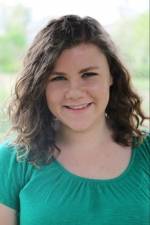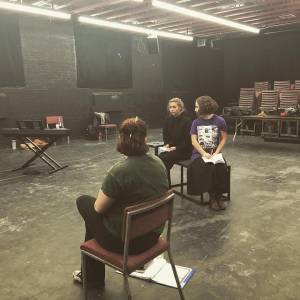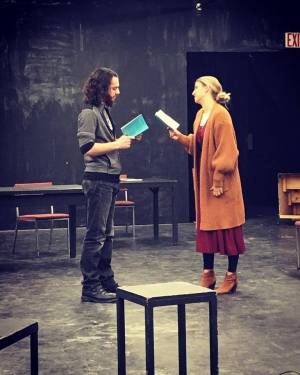One of the great benefits of theatre is its ability to teach. Not in a preachy way (at least, not always), but in the way that its poetry and production values can make learning palatable and immediate. For those of us lucky enough to see plays and musicals on a regular basis, we know that there might be no greater agent of information on an emotional level than live performance.
With that in mind, and with a continued effort to acknowledge the contributions of and respect due to women in our society, what better time could there be to educate ourselves about unsung women in science?
Lauren Gunderson’s play Silent Sky seems like exactly the right play for this moment. Haven’t heard of it, or of its protagonist, Henrietta Leavitt? Neither had I, until I read it. I found this synopsis online and cannot top it:
When Henrietta Leavitt begins work at the Harvard Observatory in the early 1900s, she isn’t allowed to touch a telescope or express an original idea. Instead, she joins a group of women “computers,” charting the stars for a renowned astronomer who calculates projects in “girl hours” and has no time for the women’s probing theories. As Henrietta, in her free time, attempts to measure the light and distance of stars, she must also take measure of her life on Earth, trying to balance her dedication to science with family obligations and the possibility of love. The true story of 19th-century astronomer Henrietta Leavitt explores a woman’s place in society during a time of immense scientific discoveries, when women’s ideas were dismissed until men claimed credit for them. Social progress, like scientific progress, can be hard to see when one is trapped among earthly complications; Henrietta Leavitt and her female peers believe in both, and their dedication changed the way we understand both the heavens and Earth.
I was very happy to speak with the play’s director, Katie Burke, about why she considers this play so important.
***
Smile Politely: When did Silent Sky first appear on your radar? How did you discover it?
 Katie Burke: In the Fall of 2016, I was a student in Latrelle Bright’s Director’s Workshop. The final project for the class was to present a 20-30 minute selection from a play. I didn’t know what play to choose to present. I wasn’t extremely sure of myself as an artist yet, and this was the first time I had the chance to flex my skills in directing a play. Earlier that year I had read Proof by David Auburn and was really interested in exploring the portrayal of women in STEM within American plays. I mentioned that to Latrelle when I was looking for guidance, and she suggested I read her copy of Silent Sky. I instantly fell in love with the script, but ultimately decided not to use it for the class. I knew I had to keep it under my belt for a bigger opportunity.
Katie Burke: In the Fall of 2016, I was a student in Latrelle Bright’s Director’s Workshop. The final project for the class was to present a 20-30 minute selection from a play. I didn’t know what play to choose to present. I wasn’t extremely sure of myself as an artist yet, and this was the first time I had the chance to flex my skills in directing a play. Earlier that year I had read Proof by David Auburn and was really interested in exploring the portrayal of women in STEM within American plays. I mentioned that to Latrelle when I was looking for guidance, and she suggested I read her copy of Silent Sky. I instantly fell in love with the script, but ultimately decided not to use it for the class. I knew I had to keep it under my belt for a bigger opportunity.
SP: It’s crucial to have that person who can point you to a good play, isn’t it? That person who says, “Oh, you have to read this.” I know you submitted this play to the Station to direct. Why the Station, and why this play?
Katie Burke: I was encouraged to submit to the Station by Latrelle after my presentation of selected scenes from Circle Mirror Transformation by Annie Baker for the Director’s Workshop. I was a bit shocked by the suggestion because I thought directing a Station show was out of my reach, but my professor and mentor saw something in me. From that moment, I started to believe in myself as an artist.
I submitted this play for so many reasons.
First and foremost, I was enchanted by the imagery Lauren Gunderson produces within her plays. I am a visual person, and the play is so vivid. The stage direction, the story. I could envision every star as I read. It is an amazing feeling to have a script call to me in that way.
Additionally, I think this is an important story for everyone to hear. When we think of famous astronomers, we think of the men. In fact, when you Google “important astronomers,” every suggestion is a man. Copernicus, Kepler, Ptolemy, Hubble, Sagan… Where is Williamina Fleming, the first woman to hold the title of “curator” and who made significant contributions to the Draper Catalogue? Where is Annie Jump Cannon, who designed a standard star classification system that is used to this day? Where is Henrietta Leavitt, the astronomer whose findings made it possible to measure the universe? These are the stories that need to be told. I knew I had to tell this one.
SP: As you’ve worked on this show, has there been a single idea or theme that has guided you along the way? Or perhaps, more than one?
 Katie Burke: There have been a couple concepts that have heavily guided me along the way in my process. Since the play is heavily rooted in science, I have been influenced by scientific terms such as polarization and orbit. The script highlights polarization within Henrietta’s life and relationships. There is this constant conflict between her duties to her family and her work in astronomy, among others. This polarization in Henrietta’s life directly influenced how I chose to stage the play, which will be in the alley [audience on two sides, facing inward, with stage in the middle] with Henrietta’s home life capping one end, and the Harvard Observatory capping the other.
Katie Burke: There have been a couple concepts that have heavily guided me along the way in my process. Since the play is heavily rooted in science, I have been influenced by scientific terms such as polarization and orbit. The script highlights polarization within Henrietta’s life and relationships. There is this constant conflict between her duties to her family and her work in astronomy, among others. This polarization in Henrietta’s life directly influenced how I chose to stage the play, which will be in the alley [audience on two sides, facing inward, with stage in the middle] with Henrietta’s home life capping one end, and the Harvard Observatory capping the other.
The idea of orbiting has also been an idea that has guided the process. Throughout rehearsal, we have discovered that Henrietta tends to be the central axis, and many characters find themselves orbiting around her.
SP: This is your first time directing at the Station Theatre, but you are not new to directing. What else have you worked on recently, and where?
Katie Burke: Though I have not directed at the Station until now, I have been involved. Last summer I had the pleasure of assistant directing Marjorie Prime [writer’s note: full disclosure—I was the director of that show], and this past December I stage managed Miss Bennet: Christmas at Pemberley. Directing credits I have include Pippin and Urinetown with Illini Student Musicals, a student-run theatre company. I have also directed select scenes from Circle Mirror Transformation by Annie Baker and Fear and Misery in the Third Reich by Bertolt Brecht. Silent Sky is the first full-length play that I have had the pleasure to direct.
SP: What is it like to direct your first “Station show?”
 Katie Burke: Directing for the Station has been a dream come true. I am so lucky to have this collective of imaginative and wonderful artists who have supported me and continue to support me throughout this journey. As I am still a student pursuing my BFA in Theatre Studies with a focus in Directing and a BA in Communication, it has been extremely neat and highly valuable to be able to work with my professors—namely Latrelle Bright and Thom Miller—as my colleagues. Also, since I come from a student-run theatre background, being able to work with this company has made it easier to focus on my job as a director. With student-run theatre, I found myself being overwhelmed with tasks that are more evenly delegated throughout the Station’s system. It has been refreshing to really hone in on my craft.
Katie Burke: Directing for the Station has been a dream come true. I am so lucky to have this collective of imaginative and wonderful artists who have supported me and continue to support me throughout this journey. As I am still a student pursuing my BFA in Theatre Studies with a focus in Directing and a BA in Communication, it has been extremely neat and highly valuable to be able to work with my professors—namely Latrelle Bright and Thom Miller—as my colleagues. Also, since I come from a student-run theatre background, being able to work with this company has made it easier to focus on my job as a director. With student-run theatre, I found myself being overwhelmed with tasks that are more evenly delegated throughout the Station’s system. It has been refreshing to really hone in on my craft.
Also, the Silent Sky team has made this experience incredibly special for me. As I am a huge proponent of advancing opportunities for women in theatre, I collected a team of all female-identifying designers and technicians. The cast includes four women: community actors Carolyn Kodes (Williamina Fleming) and Laura Alcantara (Annie Cannon), and U of I Theatre students Anika Vogen (Henrietta Leavitt) and Emma Anderson (Margaret Leavitt). Jace Jamison, a community actor, is the sole man of Silent Sky, playing the role of Peter Shaw.
SP: A lot of conversations amongst “theatre people” include how to grow and attract an audience for one’s work. Aside from “everyone in town and beyond,” who would you like to see in your audience?
Katie Burke: Diversity in theatre is a primary goal that theatre people are working to achieve. Diversity on the stage is important to me, and so is diversity off the stage. Diversity in theatre means diverse audiences. I want to see more young people in the audience. I want to see more differently-abled people in the audience. I want to see more women in the audience. I want to see more scientists in the audience. I want to see more people of color in the audience. I want to see more young, differently abled, women scientists of color in the audience. Theatre is for everyone, and we need to make it accessible to everyone.
SP: Any final thoughts?
Katie Burke: Silent Sky is an empowering story, and I find new meaning and discoveries within the play each and every day. I cannot wait to share this stunning piece with the Champaign-Urbana community.
***
Silent Sky, a play by Lauren Gunderson directed by Katie Burke, will run February 15th through March 3rd at the Station Theatre in Urbana. To make a reservation, call (217) 384-4000 or visit the Station’s website.
Rehearsal photos courtesy of Laura Alcantara.








